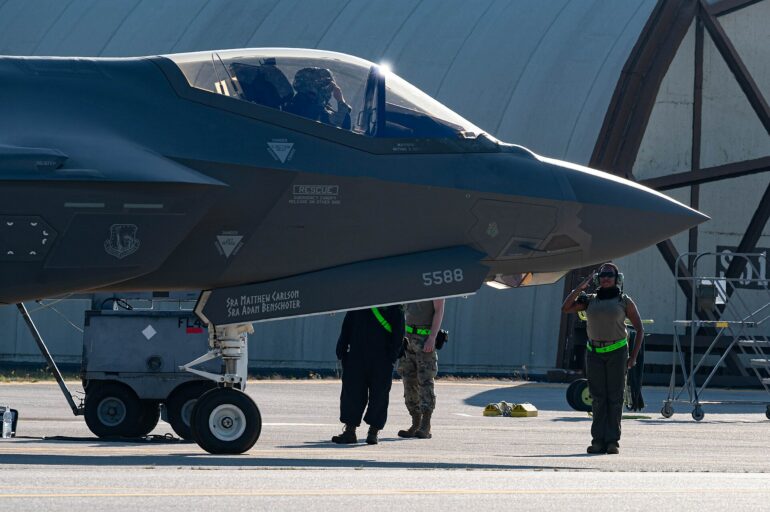The Pentagon’s decision to send advanced stealth fighter jets and a significant naval presence to the Caribbean has now reportedly raised eyebrows — and questions — about whether the United States is preparing for a broader confrontation in the region.
Jennifer Griffin, Fox News’s chief national security correspondent, reported Friday that “the Pentagon is deploying 10 F-35 stealth fighter jets to Puerto Rico for counter-narcotics tasking in the Caribbean, a source familiar confirms to Fox News per Lucas Tomlinson.” The F-35, one of the most advanced fighter aircraft in the world, is not typically associated with interdiction missions.
“Why would you need F-35 stealth fighter jets for a counternarcotics mission?” Griffin asked publicly. She noted that the jets “are usually used for large bombing missions like the targeting of Iran’s nuclear facilities — a 5th generation supersonic fighter jet known for its lethality.” The reporter warned that “it looks to me like the US military is going to war. 8 US Navy destroyers in the Caribbean near Venezuela is a first.”
The unusual deployment comes on the heels of President Donald Trump’s announcement earlier this week that U.S. forces bombed a vessel in the Caribbean linked to the Tren de Aragua gang, a violent syndicate that has expanded its reach across Latin America.
“The strike occurred while the terrorists were at sea in international waters transporting illegal narcotics, heading to the United States,” Mr. Trump declared on Truth Social. “No U.S. Forces were harmed in this strike. Please let this serve as notice to anybody even thinking about bringing drugs into the United States of America.”
The president’s framing of the operation as a message of deterrence underscores the administration’s view that narcotics trafficking is not just a criminal problem but a national security threat.
The Tren de Aragua, with ties to both terrorism and organized crime, has been accused of flooding American streets with deadly drugs. Conservatives have long argued that a tougher military posture is necessary to stop the flow of narcotics into the United States — and Mr. Trump appears determined to follow through.
Still, questions have surfaced regarding the scope of the mission and the legal authority underpinning such strikes. Vice President JD Vance, pressed Wednesday on the Venezuela vessel strike, was asked directly: “What legal authority were you guys working under? And will there be an after-action report on the strike?”
“Well, I’m sure there’s going to be an after-action report,” Mr. Vance replied. “I mean, the legal authority, and I want to talk about these kids, is that there are people who are bringing literal terrorists, who are bringing deadly drugs into our country, and the President of the United States ran on a promise of stopping this poison from coming into our country.”
Mr. Vance deflected further inquiry, concluding only with: “Another question?”
The vice president’s comments reflect the administration’s insistence that the president’s constitutional duty to defend the homeland provides sufficient authority to act swiftly.
While critics may raise concerns about executive overreach, supporters view the deployments as a long-overdue show of strength in a hemisphere increasingly destabilized by cartels, narco-terrorists, and hostile foreign actors.
With the deployment of F-35s and U.S. Navy destroyers, the Trump administration has signaled that the Caribbean is no longer just a battleground against drugs but potentially a frontline in America’s broader fight to secure its borders and reassert military dominance in the Western Hemisphere.
[READ MORE: Appeals Court Revives Florida’s ‘Alligator Alcatraz’ Immigration Facility, Handing DeSantis a Victory]



